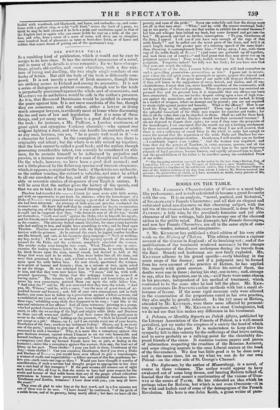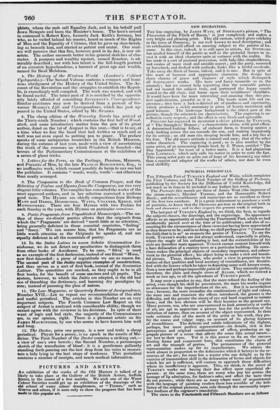BOOKS ON THE TABLE.
I. Mrs. JAMESON'S Characteristics of Women is a most lady- like performance, and is well calculated to become a great fhvourite with the sex. It is an analysis, "moral, poetical, and historical," of SitaliSPEARE'S Female Characters; and all that an elegant and cultivated mind can discourse on this charming subject, with the aid too of the choicest bits of SHAKSPEARE himself, is done by Mrs; JAMESON; a lady who, by the peculiarly feminine and yet able character of all her writings, bids fair to occupy one of the choicest- niches in the public mind. Her Ennayje, her Female Sovereigns; and now her Female Characters, are all in the same style of cora4 position—tender, rational, and imaginative.
2. Mr. KENNEDY has published a third edition of his very able work on the History of Cholera. This edition contains a copious' aceount of the disease in England ; of its breaking out ;' and of the modifications of the treatment rendered necessary by the change in the character of' the disease undergone during its travels front the East. Brandy and laudanum are now fairly exploded. Mr. KENNEDY adheres to his grand specific—early bleeding in the acute stage of the disease ; and if a judgment may be formed from his own account of his practice at Hetton, he has applied: this remedy with great success. Before his arrival there, the deaths were one in three ; during his stay, one in ten ; and, strange to say, after his departure, one in six,—as if there were some char in his presence, independent of his method of treatment, which continued to be the same after he had left the place. Mr. KEN-1 NEDY examines Dr. STEVENS'S saline methods with but a small al- lowance of favour. If the same rigid measure only were allowed; in the examination of the proportions cured in his own practice,: they also might be greatly reduced. In the 221 eases at Hettont attended by Mr. KENNEDY, were there none affected by premoni-. tory- symptoms only ? Mr. KENNEDY is a stout Contagionist, bu we do not see that this makes any difference in his treatment.
3. Polonia, or Monthly Reports on Polish Affairs, published by. the Literary Association of the Friends of Poland, is a well-meant periodical, got up under the auspices of a society the head of which. is Mr. CAMPBELL the poet. It is undertaken to keep alive the sympathy felt in this country for the sufferings of that brave nation, and to serve probably as a rallying-point for the charitably dis-. posed friends of the cause. It contains various papers and pieces. of information respecting the cruelties of the Russian Autocrat, and some stinging appeals to the once Liberal orators at the head of the Government. We fear but little good is to be done now; and in the mean time, let us try what we can do for our OWS. Poland—on the other side of St. George's Channel.
4. The Reformer, by the author of Massenburg, is a novel, of course in three volumes. The author would appear to have awakened out of some long dream, and hearing Reform talked of; fancied that the word meant a continuation of the visions of GOD- WIN or the errors of PAINE. He has ridiculed an idea whieh he perhaps takes for Reform,. but which is not even Owenism--it. is, the wild and foolish rant of some of the demagogues of the Free& Revolution. His hero is one John. Keith, a great writer of paw:.
Wets, whom the mob call Equality Jack, and in his behalf pull down Newgate and burn the Minister's house. The hero's second in command is Robert Kerr, formerly Jack Keith's footman, but who, as he waited behind his master, heard so much of the Rights of Man and the Equality of Citizens, that he gave up shoe-brush- ing as beneath him, and started as patriot and orator. Our read- ers will perceive that this fun, however good in its day, is now ob- solete. The author succeeds better in his general sketches of cha- racter. A pompous and wealthy upstart, named Renchor, is ad- mirably described ; nor with less talent is the full-length portrait of an eccentric hypochondriac, a baronet of great age and wealth, named Sir Basil Melsham.
5. The History of the Western World. (Lardner's Cabinet Cyclopwdia.)—The Second Volume contains a compact and lumi- nous abridgment of the History of the United States. The Ac- count of the Revolution and the struggles to establish the Repub- lic, is exceedingly well compiled. The work was wanted, and will be found useful. The latter part of it is enriched by the opportu- nity lately afforded of consulting JEFFERSON'S Correspondence. Similar assistance may now be derived from a perusal of Go- vernor MORRIS'S Life and Correspondence, which has just ap- peared in the United States, edited by Mr. SPARKS.
6. The cheap edition of the Witverley Novels has arrived at the Thirty-ninth Number ; which contains the first half of Wood- stock, and some introductory matter from the pen of its great author, dated on the 1st of August in this year,—that is to say, at a time when we fear the hand that had written so much and so well was not even equal to putting pen to paper. The preface speaks of some antiquarian researches in the British Museum, during the autumn of last year, made with a view of ascertaining the truth of the rumours on which Woodstock is founded—the terrors of the Parliamentary Commissioners at the exhibition of a series of ghost tricks.
7. Letters for the Press, on the Feelings, Passions, Manners, and Pursuits of Men, by the late FRANCIS ROSCOMMON, Esq., is an inoffensive work, which cannot possibly do harm to any one but the publisher. It contains " words, words, words"—not otherwise than neatly arranged.
8. The Companion to the Book of Common Prayer, and the Selection of Psalms and Hymns from the Companion, are two very elegant little volumes. The compiler has consulted the works of the most approved authors, and in her selection exercised a uniform Kood taste. The Hymns are chiefly compositions from Bishops Al ANT and IIEBER, DODDRIDGE, WATTS, COLLYER, KEBLE, and MONTGOMERY. There are four Hymns with two Psalms for each Sunday in the year, with Hymns on particular °spacious.
9. Poetic Fragments fronz Unpublished Manuscripts.—The au- thor of these soi-disant poetics allows that the originals from which the " Fragments" are derived "merit little or no attention," being generally deficient in those essential requisites, "feeling" and "fancy." We can assure him, that his Fragments are as little worth attention as the Originals he speaks of, and are equally deficient in all the essentials of poetry.
10. In the Initia Latina in usum Schole Grammatica Le- vishama, we do not detect any peculiarities to distinguish them from other books of Accidence. To be sure, "Silva' is used as an example of the first declension, instead of our friend "Musa," now first discarded : a piece of ingratitude we see no reason for. The .second part of the hvitia supplies examples of construction, and thus serves as a sort of first book, instead of the Sententice Latitue. The quantities are marked, as they ought to be in all first books, for the benefit of some masters and all pupils. The system, however, to which the Initia are adapted, is the old bad one of thumbing the dictionary, and learning dry paradigms by rote; instead of pursuing the plan of nature.
11. The Law Magazine, or Quarterly Review of Jurisprudence, Number XVIL—Let us repeat our recommendation of this able and useful periodical. The articles in this Number are on very important subjects. The Fourth Common Law Report on the subject of Arrest is analysed with considerable ability, though we cannot agree with the reviewer in his decisions. In spite of their want of logic and bad style, the majority of the Commissioners are, in our opinion, right. There is a pleasant article on Sir JAstss MACKINTOSH, by one who seems to have known him well and long.
12. The Doctor, price one penny, is a new and truly a cheap periodical. Physic for a penny, is an epoch in the annals of Me- dicine. The First Number of the Doctor contains a striking cut,— a view of one's own bowels ; the Second Number, a picturesque sketch of the transfusion of blood : it is a gentleman gallantly standing forth pouring out the last drop from his veins to resusci- tate a lady lying in the last stage of weakness. This periodical contains a number of receipts, and much medical information.



























 Previous page
Previous page